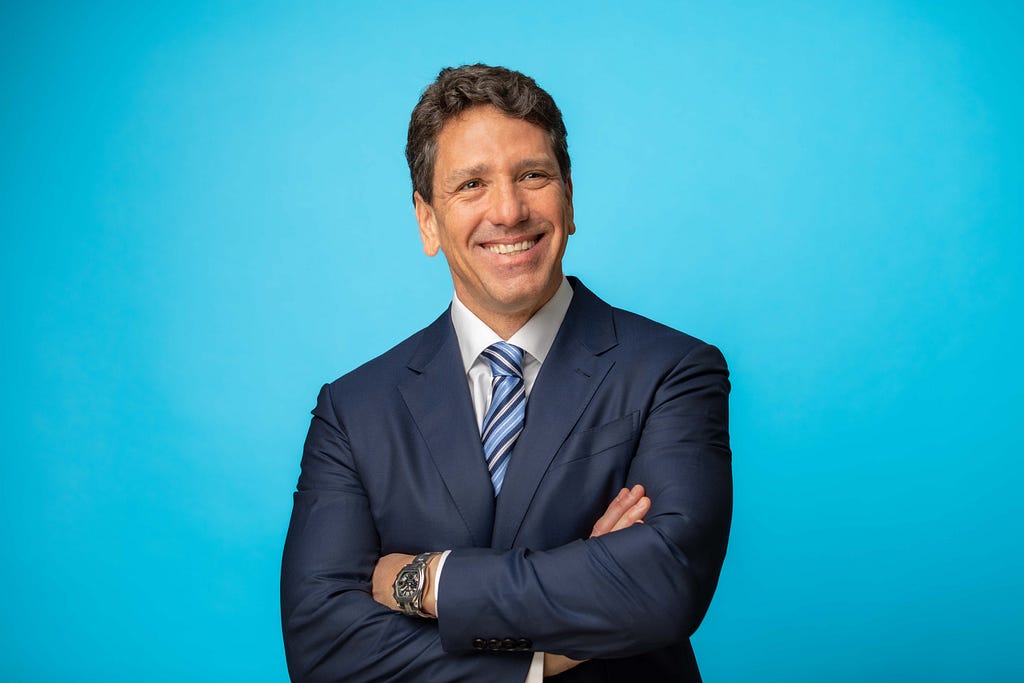Johnson & Johnson’s Calvin Schmidt: Five Things You Need To Be A Highly Effective Leader During Uncertain & Turbulent Times

Take care of yourself and others, never losing focus on the importance of your physical, emotional, mental, and spiritual wellbeing to the extent you can while you’re embracing uncertainty.
As part of our series about the “Five Things You Need To Be A Highly Effective Leader During Turbulent Times”, we had the pleasure of interviewing Calvin Schmidt.
As leader of Worldwide Government Affairs & Policy at Johnson & Johnson, Calvin Schmidt manages a dedicated team committed to positively impacting health systems, providers and patients around the world. He believes that access to affordable, quality healthcare is the defining public policy issue.
Thank you so much for your time! I know that you are a very busy person. Our readers would love to “get to know you” a bit better. Can you tell us a bit about your ‘backstory’ and how you got started?
Well, my career journey hasn’t been the most conventional, but I feel very fortunate about the path I’ve taken. Originally, I started out with aspirations to be a professional soccer player, but when the stars didn’t align, I made a career jump into the corporate world. I started off with a job as a process control engineer on the machine room floor of Mars, and from there after getting my MBA, I charted a unique professional journey that took me through a variety of domestic and international leadership positions in operations, R&D, product development, sales, marketing and general management. Each role was very different, but the dynamic array of professional responsibilities and lessons learned throughout my career helped make me a better leader today. One of the most important things I’ve learned over time is that healthcare is something that touches us all. It impacts how we live, work and, ultimately, our ability to thrive. No matter what I’m doing for work, that truth is my north star.
It has been said that our mistakes can be our greatest teachers. Can you share a story about the funniest mistake you made when you were first starting? Can you tell us what lesson you learned from that?
A big lesson I learned from my time leading J&J’s global nutritional business in 2005 is that you must enroll your organization and team members in the development of your strategies; even if it ends up in the place you already know it’s going to end up, you have to bring everyone along with you. As a leader, you need a strategy and a vision, but when you don’t seek out feedback or others input, you can set yourself up with a course of action that people don’t feel ownership or feel like won’t work. You might not get that feedback until it’s far into execution, which is what happened to me. It feels like a funny mistake to me now because I am constantly getting feedback and thoughts from my team. But when you get too busy, want to act with urgency or feel overwhelmed and you’re juggling too many things, it’s important to remember to take the time to proactively listen and ask for the input of others. Great leadership will never exist in a vacuum.
None of us are able to achieve success without some help along the way. Is there a particular person who you are grateful towards who helped get you to where you are? Can you share a story?
There are so many I could think of but Sumantra Ghoshal — who was an Indian scholar, educator and a mentor to me and many others — comes to mind here. In the late 90s, I participated in a senior executive global business consortium which he led in partnership with the London Business School, where he spoke a lot about the importance of putting yourself outside of your comfort zone. He would always say, “How will you know if you are any good if you don’t put yourself in uncomfortable situations you don’t know anything about?” Sadly, he passed away young suddenly so I spoke at his memorial service and talked about the impact he had on me, how he taught me the value of experiencing uncomfortable situations with no compass and no navigational system. The more you do that, the better you become at mapping your way in an engaging, authentic, cross cultural and global manner. I really credit him for being such a wonderful mentor and friend and teaching me so many of the invaluable cross-functional, cross-global and cross-cultural leadership philosophies I’ve applied throughout my career.
Extensive research suggests that “purpose-driven businesses” are more successful in many areas. When your organization started, what was its vision, what was its purpose?
One of the things that drew me to Johnson & Johnson was our Credo. Putting patients, doctors, nurses and employees, our community’s wellbeing first really resonated with me. And I think what’s most impressive is the Credo was written in 1944, long before it was the norm for companies to put corporate responsibility and the true purpose of a corporation into practice. I find it incredibly rewarding to be a leader for a company committed to advancing health for humanity, which is why I’ve stayed for nearly 20 years — and why I am so passionate about my leadership role today.
Thank you for all that. Let’s now turn to the main focus of our discussion. Can you share with our readers a story from your own experience about how you lead your team during uncertain or difficult times?
I think we all have a pandemic story to tell. A lot of people had to cope with business slowing or coming to a halt in 2020, but our organization contended with the opposite experience because of our critically important role in developing, producing and ensuring access fora Covid-19 vaccine and our duty to provide support and resources to customers and front-line healthcare workers. Navigating COVID-19 and its countless ripple effects across our industry and public health system presented a ton of challenges and hurdles. Everything was changing and evolving at rapid speed, and we were right at the heart of it. When you’re working in that kind of fast-paced, high-pressure environment, it can easily become toxic and polarizing. Everyone — including me — was experiencing their own unique set of professional and personal challenges. I would remind myself of this every day and make a concerted effort to listen to both my own emotions and those of my team, which was vital to keeping our supportive, people-first culture in place while we navigated the stress of the unknown. Even now, with the pandemic in our rearview, I recognize that a new normal doesn’t actually exist and we have to be okay with that. We have to be okay with operating in the unknown. In good times and bad, my goal is to cultivate a work environment and culture that is supportive, constructive and sustainable. Don’t be afraid of disruption and change — embrace it!
Did you ever consider giving up? Where did you get the motivation to continue through your challenges? What sustains your drive?
I honestly can’t say that I have. As I mentioned, I originally wanted to pursue a career as a professional soccer player after college and, when that didn’t pan out, it was definitely a disappointing and reflective moment. I felt a sense of failure and a crisis of identity. I was faced with a number of questions, the biggest being, “what do I do from here?” After some self-reflection — and with the support of friends and family — I made a decisive pivot and entered the corporate world. From there, I found a meaningful career at a company that reflects my own personal values. I’m passionate about what we do at J&J, and I’m motivated every day by the fact that our medical innovations and solutions have a tangible positive impact on patients’ lives. Throughout my journey, I’ve taken solace and comfort in the fact that no matter the circumstances, there can be light at the end of the tunnel, but reaching it requires a strong work ethic and a commitment to absorbing the wisdom of those you surround yourself with — from friends, to family, to colleagues.
I’m an author and I believe that books have the power to change lives. Do you have a book in your life that impacted you and inspired you to be an effective leader?
I would recommend Life Is in the Transitions: Mastering Change at Any Age by Bruce Feiler. It’s a great guide on how to navigate life’s biggest changes with meaning, purpose and skill. What I appreciate most is that it gives you specific strategies and actions to take that can make periods of upheaval a little easier, which I think is invaluable given that change is truly the only constant in life. We’re perpetually going through it and with every new generation, it’s happening at a faster and faster rate. As a global business leader, one of the best things you can do for yourself and your team is to equip yourself with the tools to not only cope with change, but to flourish with it as well.
What would you say is the most critical role of a leader during challenging times?
I cannot emphasize this enough: no matter who you are, where you are or what you do, you’re going to encounter change, and your response to it will play a huge role in how you experience it. You need to mentally prepare yourself to come up against the unexpected. During tough transitions, no one is going to make all the right choices, but it’s easier to make calls and adapt when you accept that change is unavoidable, and even embrace it when you can. Again, there is always a light at the end of the tunnel. Things get chaotic, but you can always sleep on your decisions, reflect after you’ve weathered the storm and learn from your experiences — both the missteps and the wins. And when those missteps happen, own your mistakes and learn from them.
When the future seems so uncertain, what is the best way to boost morale? What can a leader do to inspire, motivate and engage their team?
First, listen and be honest and transparent with your team about the challenges you are facing. Underplaying a crisis or not fully acknowledging the reality of a situation will only show further doubt and anxiety among your team and colleagues.
Second, foster a sense of shared purpose and a communal bond. Use team activities, retreats, or 1:1 meetings to demonstrate that we are all wrapped in the same cloth of destiny, so to speak. During a challenging situation or when facing severe economic headwinds, people can feel isolated and disconnected, which can lead to anxiety and a lack of confidence in leadership. That’s why this second point is so important.
Third, be present and lead from the front to offer tangible solutions, or at the very least, a positive vision that teams can moor themselves to in a turbulent environment. Even if a leader doesn’t have all the answers (and they rarely, if ever, do), demonstrating to employees that you’re working to find a solution can be enough to boost morale.
What is the best way to communicate difficult news to one’s team and customers?
Delivering bad news is one of the toughest things to do as a leader, which is why it’s so important to learn how to do it with compassion, authenticity and professionalism. You’ve got to come to every difficult conversation fully prepared, which means equipping yourself with the information and context you need to not only clearly communicate the news and the rationale behind it, but also to answer questions it will elicit as well. More importantly, show empathy and put yourself in other people’s shoes; try to understand their unique circumstances and perspective so that, no matter what the news is, you can engage your stakeholders honestly and with humility.
How can a leader make plans when the future is so unpredictable?
I think you have to accept that you only have so much control over what happens in life and focus on the factors under your purview. These days, “normal” can mean different things to different people, but I also think humans need a sense of stability whenever and however we can get it. It’s part of our DNA. For leaders, that means operating with the assumption that things will generally go according to plan while also considering the “what ifs” and keeping alternate courses of action in your back pocket. Planning for derailment enables you to offer a modicum of stability in times of crisis, which can make all the difference when it comes to the morale of your team and their ability to adapt. And when something does go awry, you can’t stand still. You’ve got to assess, respond and keep moving forward. As the esteemed Bear Grylls so aptly said, “improvise, adapt, overcome.”
Is there a “number one principle” that can help guide a company through the ups and downs of turbulent times?
Make the choice to embrace uncertainty, disruption and change, but don’t get bogged down in worrying about the worst-case scenarios that might come along. Think about what could go wrong and what might need to be done, but don’t let it overtake your day-to-day responsibilities. In other words, you want to strike the balance between thinking ahead while staying focused on the present.
Can you share 3 or 4 of the most common mistakes you have seen other businesses make during difficult times? What should one keep in mind to avoid that?
Losing your sense of calm. I am a scuba dive master, so I like to use a scuba diving analogy for this scenario. When you’re in a difficult situation — scuba diving or otherwise — it is very important to remain calm because it allows you to prioritize and have clarity and focus.
Not communicating clearly with your peer set or organization. The more you can be transparent and articulate when communicating with others, the greater the chance for success. Ask for help when you need it and ask for input before making a big decision.
Only listening to the loudest part. Look for quiet pockets because they typically have really great insights — lean into the quiet moments and use them to learn.

Here is the primary question of our discussion. Based on your experience and success, what are the five most important things a business leader should do to lead effectively during uncertain and turbulent times? Please share a story or an example for each.
Lead through your values and find purpose and passion in what you want and what you do.
Take care of yourself and others, never losing focus on the importance of your physical, emotional, mental, and spiritual wellbeing to the extent you can while you’re embracing uncertainty.
Leverage your own personal North Star to guide you when there is no playbook.
Be agile, adjust, find Plan B and if needed make it your plan A, be resilient, and maintain a learning and growth mindset for yourself and those around you.
Know you have choices. It’s not always easy to make a different choice but know there are choices to be had.
Can you please give us your favorite “Life Lesson Quote”? Can you share how that was relevant to you in your life?
My late father used to say, “the more you know, the more you don’t know,” and I’ve thought about that often throughout my life. It’s amazing how much your childhood connects to the way you navigate life as an adult. I realized a long time ago that learning is a gift, and my father’s adage is so true. The more knowledge you acquire, the more you realize there’s a whole universe of information out there that you haven’t even accessed. That’s why the ability to acknowledge what you don’t know and savor the reward of slow, continuous improvement and evolution is something to celebrate — not something to be embarrassed by.
How can our readers further follow your work?
The best way to follow my leadership work is my personal LinkedIn profile.
This was very inspiring. Thank you so much for joining us!
Johnson & Johnson’s Calvin Schmidt: Five Things You Need To Be A Highly Effective Leader During… was originally published in Authority Magazine on Medium, where people are continuing the conversation by highlighting and responding to this story.
